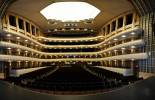Proposed downtown noise ordinance a bad idea
Back in 2008, the Las Vegas City Council set about attempting to renovate a six-block area of Fremont Street, east of the Fremont Street Experience, which had become known for crime and blight.
Then-Mayor Oscar Goodman and others envisioned a lively nightclub district, generating crowds and tax revenues. They passed exemptions to the city noise ordinance, as well as to rules that limited the proximity in which establishments serving alcohol could adjoin one another.
Attracting the millions of dollars in private investment that can turn such a vision into realty can take years. But gradually, “Fremont East” has gone through its birth pangs and has started to succeed.
So how does the city plan to reward the 10 business pioneers who “re-settled” this neighborhood with taxpaying, tourist-drawing enterprises?
A restored noise ordinance that could drive many of these new music venues out of business is expected to be introduced before the City Council as soon as Oct. 19.
Residents of extended stay motels in the area, including the Downtowner, which has been located at 129 N. Eighth St. since 1963, complain the music blares till 5 a.m. and they can’t sleep.
The proposed ordinance would restrict outdoor music after midnight from Sunday through Thursday and after 2 a.m. on Friday and Saturday.
“If this ordinance is passed, we are out of business,” says Frank Elam, owner of the building tyhat houses the new Azul nightclub. Elam and Francisco Lara, the nightclub operator, have invested about $750,000 in the property at 115 S. Seventh St. on the understanding they could hold late concerts.
James Woodbridge, co-founder of the Neon Reverb music festival, said late-night limits would be a death knell to the burgeoning district because prime partying time in Las Vegas doesn’t even start until 11 p.m.
Las Vegas has a tourist-driven, entertainment-based economy. The nightclub district was created in an attempt to win back some of the business that has fled the cramped downtown area for the larger, more modern properties on the Strip, four miles to the south. The campaign to create this district, led by Mr. Goodman, was no secret. The area chosen is not primarily a residential district. It was a mess. If the city goes back on its word in this case, after actively soliciting these businesses, why would any business owner ever again invest a dime, anywhere inside the city limits, based on promises from city officials?
David Sullivan, whose firm designs and installs sound systems for nightclubs, says technology is available that can reduce sound that escapes from such music venues. Mr. Sullivan, whose company has installed sound-reduction technology at The Cosmopolitan, said similar technology could help downtown.
Current mayor Carolyn Goodman agrees. “I think there are things we can do to mitigate this,” to balance the interests of residents and businesses.
It’s worth a try. And a far better alternative than a party-killing noise ordinance.


















